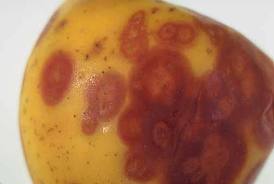Host range and control of Cryptosporiopsis spp, a cashew blight pathogen
Keywords:
Fungicides, adjuvants, Cashew, Cryptosporiopsis spp, in vitro, host rangeAbstract
Ten fungicides and three adjuvants were evaluated on spore germination and mycelial growth of Cryptosporiopsis spp isolated from cashew (Anacardium occidentale) in vitro. Effects of selected pesticides and adjuvants were determined using food poisoning technique and conidial germination assays as indicators of sensitivity. The pesticides were tested according to labeled rates. Among the pesticides tested, Chlorothalonil (720g/L) inhibited Cryptosporiopsis spp mycelial growth and conidial germination. Tebuconazole (0.75 lbs), Tebuconazole (4.5%) + sulphur (70%), and Triadimefon 25% + Metalaxyl 20% reduced mycelial growth but did not reduce conidial germination, while sulphur had no adverse effect on either the mycelial growth or conidial germination of Cryptosporiopsis spp. Mancozeb (80%), Mancozeb 480g/kg + Metalaxyl 100g/kg, Mancozeb 680g + Metalaxyl 40g/kg and Picoxystrobin (250 g/l) inhibited conidial germination but did not reduce mycelial growth. Among the adjuvants, potassium chloride inhibited both spore germination and mycelial growth. Long-term exposure of the fungus to the pesticides by growing it on malt extract agar amended with pesticide resulted in inhibited mycelial growth. A study was carried out to determine the host range of Cryptosporiopsis spp. The fungus which causes cashew leaf and nut blight infects young tender shoots, pseudo-fruits and nuts. Host range studies of Cryptosporiopsis spp were conducted on potted plants in a glasshouse using non-target plant species belonging to nine plant families. The tested species, in addition to sorghum, comprised crop species reported to be intercropped in cashew farms as well as economically important cultivated crops. Five of the tested non-target plant species were immune; none developed any symptoms of infection when inoculated with Cryptosporiopsis spp. The test plants were mango (Mangifera indica L), cassava (Manihot esculenta Crantz), and sorghum (Sorghum bicolor L.) Moench), pigeon pea (Cajanus cajan (L.) Millsp), sweet potato (Ipomoea batatas (L.) Lam), lemon (Citrus limonum Risso), mung bean (Vigna radiata (L.) Wilczek) and Eucalpytus spp. Artificial inoculation of the test plants with spore and mycelial suspension of Cryptosporiopsis spp showed that leaf symptoms were produced in sorghum, mung bean, sweet potato, eucalyptus and cassava. Blight symptoms caused massive damage on the foliage of affected plants that caused wilting and eventual death of inoculated plants. The severity of symptoms varied in the different plants tested in the study.

Published
How to Cite
Issue
Section
Copyright (c) 2013 D. Menge, M. Makobe, V. Agboton, S. Shomari, A. V. Tiedemann

This work is licensed under a Creative Commons Attribution-NonCommercial-NoDerivatives 4.0 International License.



